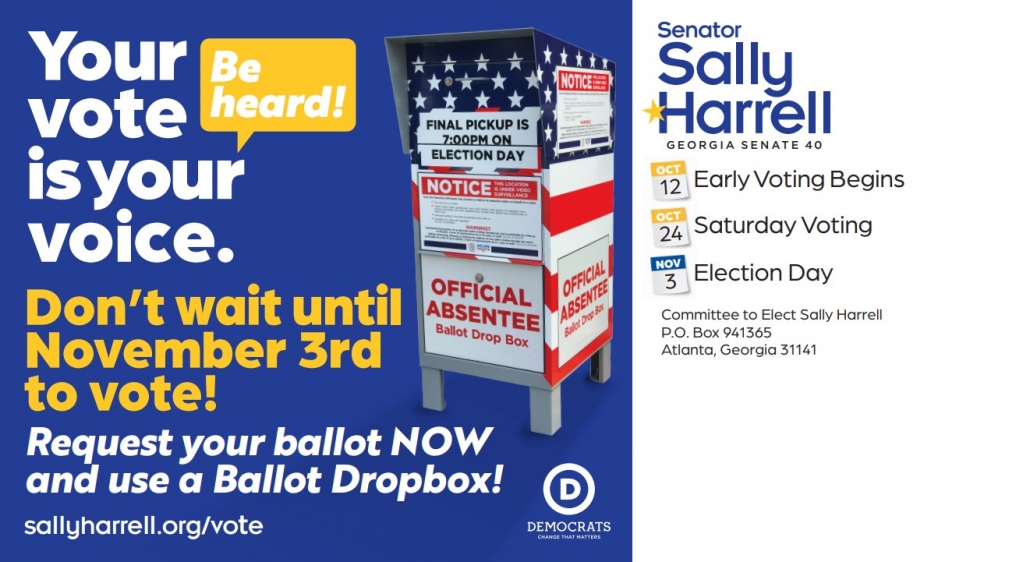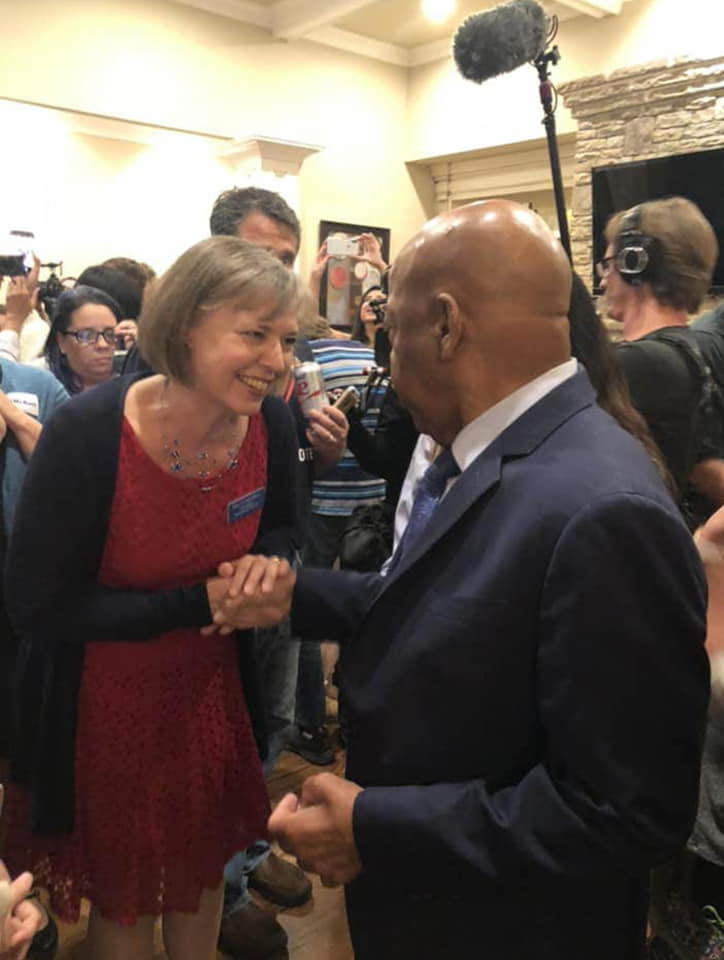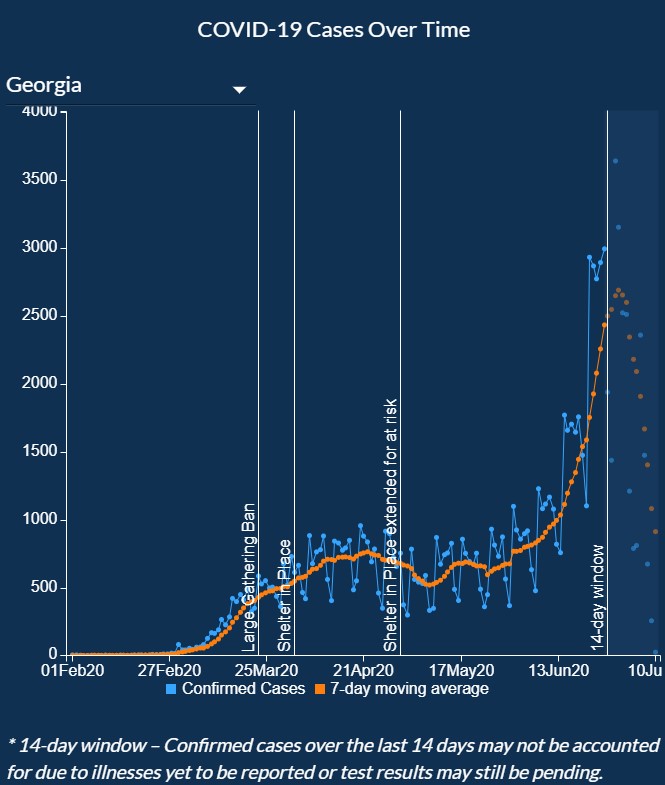Sally’s Senate Snapshot #12 – It’s Over!
Last week was bad, but this week was worse. At times I felt like I was observing the pit of humanity. At other times I felt like I was in the middle of a war, with bad bills circumventing the process overnight. All this was played out against a backdrop of spiking COVID cases and sick staff being sent home to quarantine. Sine Die (the last day of the session) was a welcome relief.
But it’s finally over, and now, with just four months to go, it’s time to get focused on elections!
November will change the face of the Georgia legislature. Picking up three Senate seats in 2018 saved Georgia from private school vouchers that would have further destroyed our public schools.
The abortion ban last year and this week’s police bill both passed the House with only 92 votes (they needed 91 to pass). We will pick up enough seats this November to block these kinds of reckless bills. We could pick up enough seats to block Republicans from being able to gerrymander districts into the next decade.
The Georgia Ethics Commission ruled in April that the law banning legislators from accepting campaign contributions during session remained in effect while the session was suspended. This means I have been unable to raise money since January. If you have appreciated these emails, and are able to donate, please help me keep this seat next term. I do have a Republican opponent who has been able to fund raise the entire time. Donate online at https://actblue.com/donate/sd40
Hate Crimes Legislation Takes Center Stage
Following a one-day break for Father’s Day, Monday June 22nd started out early with a Natural Resources & Environment Committee meeting. This meeting was led by a Chairman who refused to wear a mask the entire two weeks. We took up HB 1057, which bans domestic septage in fertilizer, a harbinger of the week to come.
Stay with me, it’s a long story…
HB 426, The Hate Crimes Bill: In my last Snapshot, I told you about the evolution of the Hate Crimes bill. Intense behind-the-scenes negotiations continued Monday, and by Monday afternoon, I heard that the police protection language had been dropped, data collection added, and the bill was headed to the Rules Committee.
After sitting through a long floor debate about broadband pole rates and EMCs (Electric Membership Corporations), I decided to stay late to attend the historic Hate Crimes vote in the Senate Rules Committee. To me, this was an important repeat of Georgia history: I cast my first vote for Georgia Hate Crimes legislation in 2000 when I served in the House. That law was later struck down by the Georgia Supreme Court due to its vague language.
HB 426 passed Senate Rules with a few votes against, but the Majority Leader abstained stating he had just received the language for the new bill and had not yet had time to review it. Things looked hopeful for the next day, but unsettled among Republicans. Then came the surprise…
HB 838, The Police Bill: The Rules Committee Chairman pulled out a Committee Substitute to HB 838, with the original language completely stripped out and eight pages of a brand new bill inserted in its place. The new bill created a felony crime of “Bias Motivated Intimidation” against a police officer, defined a Police Officers’ Bill of Rights, and included a right for police officers to sue civilians. It was hastily written legislation that was never vetted or debated in Committee, had no public feedback, and would be on the floor of the Senate for a vote the next day.
Timing is Everything: HB 838 passed the Senate early the next morning, but with another surprise Republican amendment no one was given time to read, which deleted the “Bill of Rights” section. HB 426, the Hate Crimes Bill, came to the Senate floor in the afternoon, and passed with a wider margin. Both were immediately transmitted to the House. Since both bills had originated in the House, but were amended by the Senate, the House would have to vote to agree or disagree with the changes made by the Senate.
The House delayed voting on HB 838 until after the Senate had passed HB 426. Timing was everything. If the police bill passed but the Hate Crimes bill did not, there could be severe civil unrest. Ultimately, the Senate version of both bills passed both chambers: the Hate Crimes bill with overwhelming majorities, and the Police Bill much more narrowly.
The narrative was that the police bill was needed to secure the Republican votes for the Hate Crimes bill, but I believe we had the votes for HB 426 without the police bill. Unfortunately, we will have to deal with the negative consequences of HB 838, which will only contribute to further mistrust between the police and the citizens they are meant to serve.
And that was only Tuesday! The Hate Crimes legislation was signed into law by the Governor on Thursday, among a crowd of supporters, and demonstrators holding signs that said, “Veto HB 838.”
The Rest of the Week
Bills that Passed
HB 793, The Budget: I voted no. A conference committee of House and Senate members worked through their differences, and both chambers ultimately approved the compromise, fulfilling our only Constitutional duty. But I could not vote for a budget that cuts school funding by $950 million and severely underfunds other critical services such as mental health and disabilities. Remember that these deep cuts were necessary because of a budget that was in disarray before the pandemic thanks to irresponsible Republican tax cuts. We’re already seeing the effects of an understaffed Department of Labor that can’t keep up with unemployment claims, a disturbing issue I raised at the Senate well this week and something I plan to work on in the interim.
HB 1114: I voted yes. This bill provides six months of Medicaid coverage to new mothers following childbirth as well as Medicaid lactation services. Georgia’s maternal mortality rate is one of the highest in the country, with black mothers dying at even higher rates than others. This was a big win for the Georgia Legislative Women’s Caucus, which I have chaired for the last two years. 19.7 million dollars was allocated in the budget for this coverage. This is one tiny step toward Medicaid expansion.
SB 359: I voted no. This bill shields business from COVID-19-related liability. It requires the claimant to prove gross negligence, which is extremely difficult. Though businesses might fear lawsuits, it would be very difficult to prove where a person “caught” COVID-19. This law could disincentivize business and other entities from taking necessary steps to protect their employees and customers from COVID-19.
HB 879: I voted yes. I know many of you will like this one! It allows for expanded home delivery for alcohol. As an aside, April revenues showed a dramatic increase of alcohol sales tax during the Shelter-in-Place Order.
SB 416: I voted yes. It cuts legislator Pay by 10%. Legislators make $17,350/yr in addition to per-diem for several Committee days throughout the year.
HB 857: I voted yes. This prohibits burning railroad ties treated with toxic creosote, with some exceptions. This bill passed both chambers unanimously.
SB 375: I voted yes. This bill raises the age to buy tobacco and vaping products to 21, and adds a 7% tax to vaping products (Georgia currently has no vapor excise tax). No action was taken to raise Georgia’s tobacco tax, which is one of the lowest in the county. Several research groups and advocacy organizations have noted that increasing the tobacco tax could help address our revenue shortfalls this year due to the pandemic.
HB 987: I voted yes. It improves staffing, training and accountability at long-term care facilities. In amendments added by the Senate, it requires senior care homes to plan for a pandemic, have a supply of PPE, and to notify residents and family members of a COVID outbreak.
Bills and Ideas that Died on the Vine
HB 463 “The Elections Bill”: This was the elections bill that began in 2019 in the Senate. The House stripped all the language from the Senate bill and added new language that included banning governments (state, counties and municipalities) from being able to mail out absentee ballot request forms. This was an overt attempt at voter suppression during a pandemic.
HB 765 “Magistrate Judge Salaries”: This bill would have raised salaries for magistrate judges 21.6 percent. Yes, you read that right — “raise” during the worst budget crisis since the Great Recession. Someone in the Senate really wanted those raises, because we wasted a considerable amount of time debating this bill on the floor of the Senate. It got tabled, then removed, amendments failed, and then, it finally passed the Senate amended with an enactment delay of two years. I voted no. The House, which moved slower because they took social distancing much more seriously than the Senate, ran out of time to act on the Senate version, so ultimately the bill did not pass.
Gambling: There was a lot of talk about passing enabling legislation to allow for sports betting, casinos and pari-mutuel betting. None of these bills passed this session.
Revenue Enhancements: There was also a lot of talk about ideas to generate revenue to plug the holes in the budget, including rolling back special-interest tax breaks, revenues from gambling, and raising the tobacco tax to the national average. But for the most part, none of these happened. In 2018, the legislature passed a huge income tax cut based on expected revenue that never materialized. There was zero talk about reversing this tax cut, yet this tax cut is a big part of why we are having to cut things like public education by another billion dollars.
HB 906, Ossabaw Island: This bill sought to amend the Heritage Preservation Act of 1975 by allowing up to 15 acres of property to be transferred to local governments and “business entities.” Currently, Ossabaw Island is protected under a 1978 Governor Executive Order that only allows recreation that promotes research, education and preservation. Follow the Georgia Conservancy for more details.
Peachcare Public Option Study Committee: This year, I filed SB 339, that would create a plan for a Medicaid Public Option. The bill was assigned to the Senate Appropriations Committee, and Chairman Jack Hill not only allowed me to present SB 339 to his committee, but he also wrote me a letter saying that he believed it to be a worthy idea and would support a study committee to conduct an actuarial analysis of such a plan. Sadly, Republican leadership did not allow that study committee to move forward. I will re-file this bill next year.
Looking Ahead
We have big challenges ahead. COVID case numbers are on the rise. Schools and universities will be returning to classes in some form or another soon. Our unemployment system must be overhauled to prevent food and housing insecurity. Our hospitals must remain vigilant to prepare for surges of patients.
Now, more than ever, we need a functioning government at local, state and national levels.We need leaders who believe in the power of government to serve and support our communities. We have four months to ensure that we can carry out an election in the midst of a pandemic, and we must force our leaders to do what’s right for democracy.
I pledge to you that I will be working every day in the coming months to embrace all these challenges. Help me to be part of the solution by donating to my re-election campaign if you are able. Every little bit helps!
| Pictures from week 12 of the 2020 Legislative Session |
|
 |
|
This is where the rope line used to be, where Senate pages sat and Senators greeted constituents
|
|
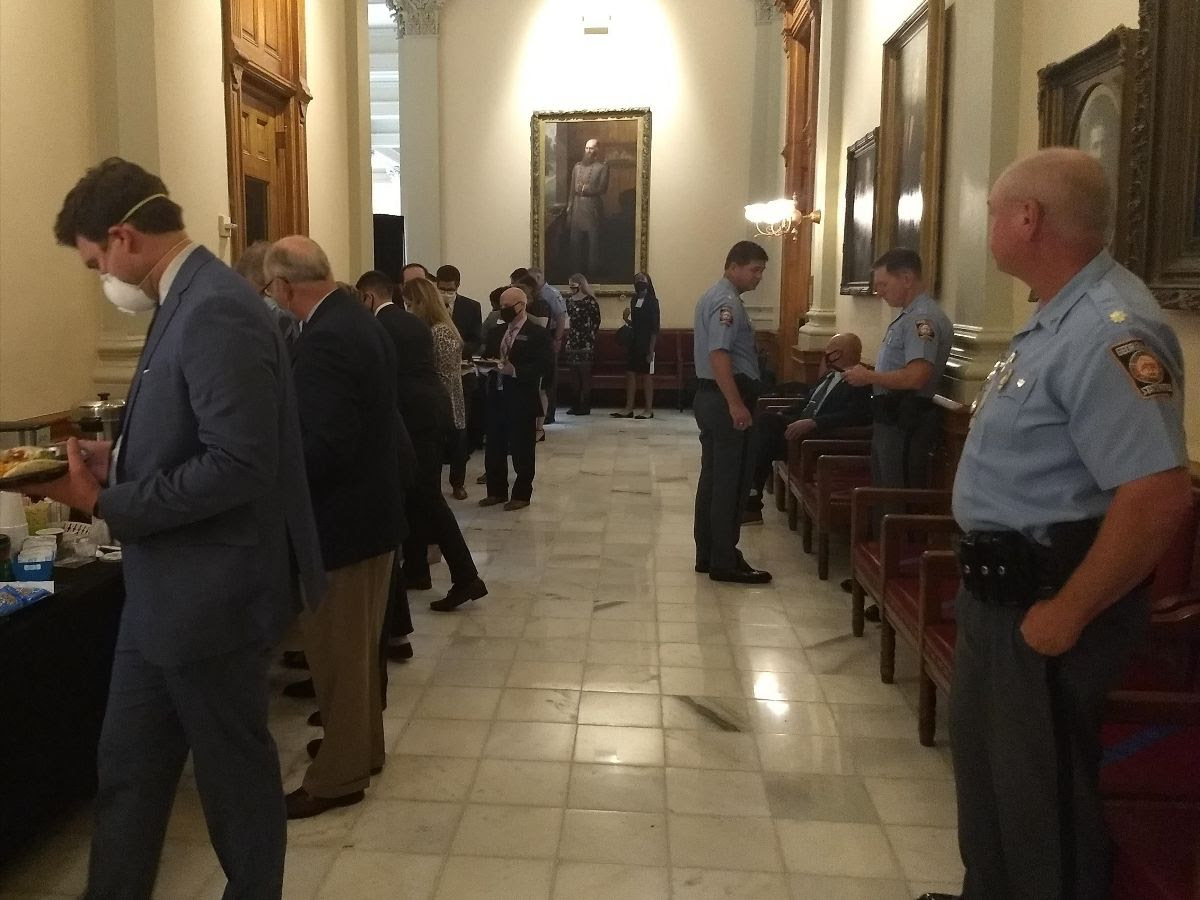 |
|
On Thursday, the Senate served a buffet-style lunch (which I did not eat). Social distancing was not observed. Law enforcement officers declined to wear masks all week.
|
|
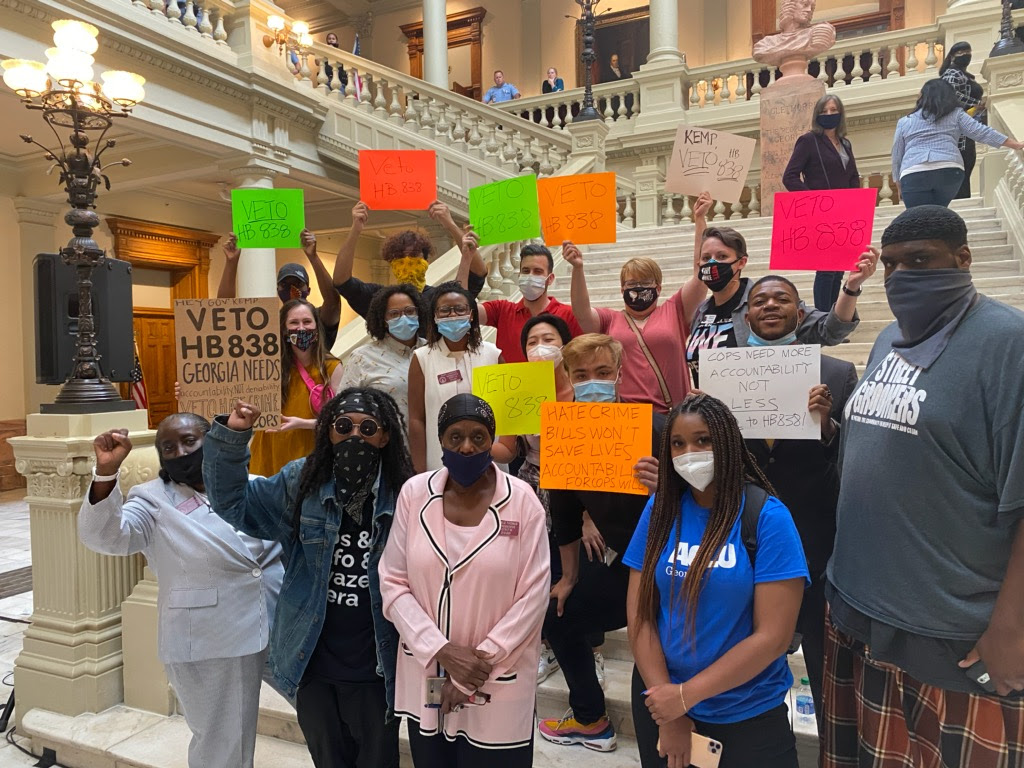 |
|
Protesters ask for the police bill, HB 838, to be vetoed by the Governor. Call Governor Kemp at 404-656-1776 and ask him to veto HB 838.
|
|
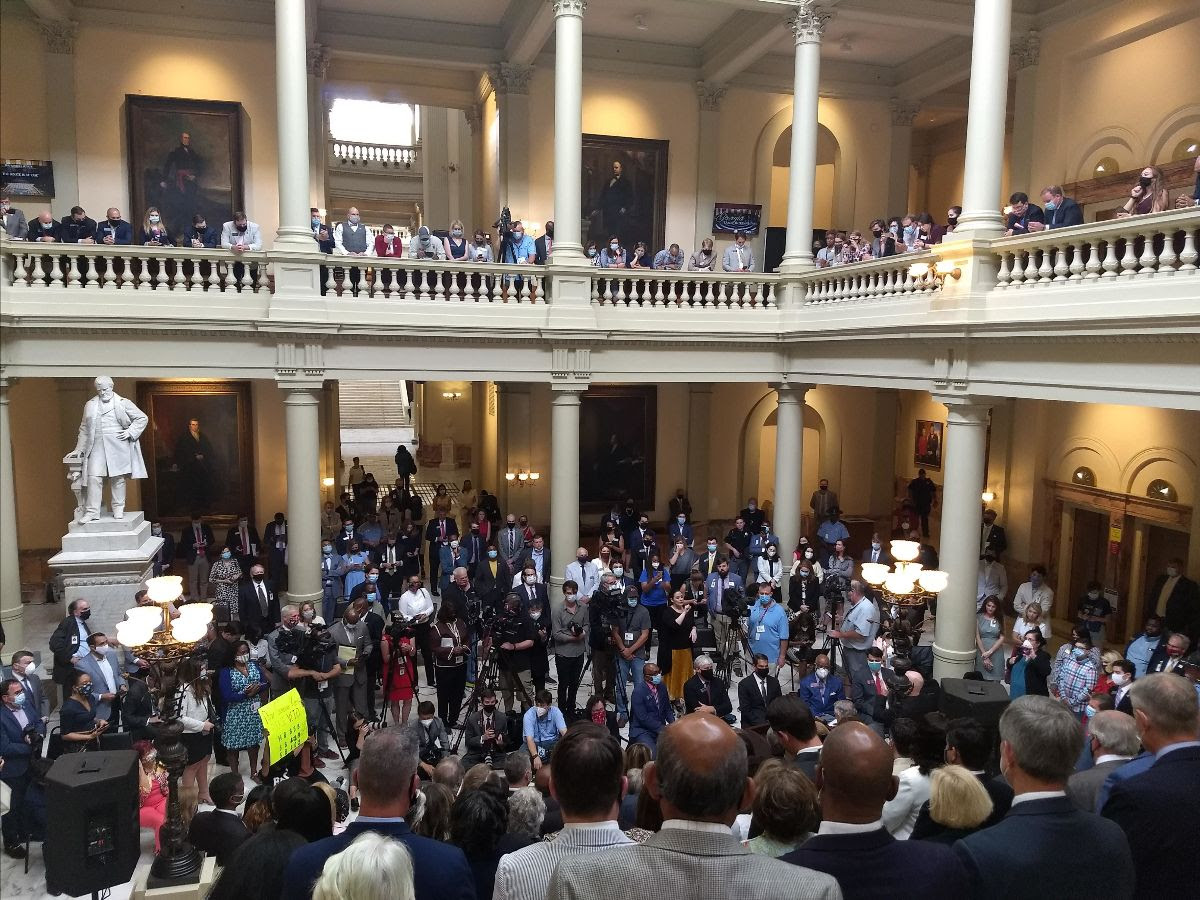 |
|
Hate Crimes Bill Signing: A crowd of people gather at the Capitol for the signing of HB 426, the Hate Crimes bill.
|
|
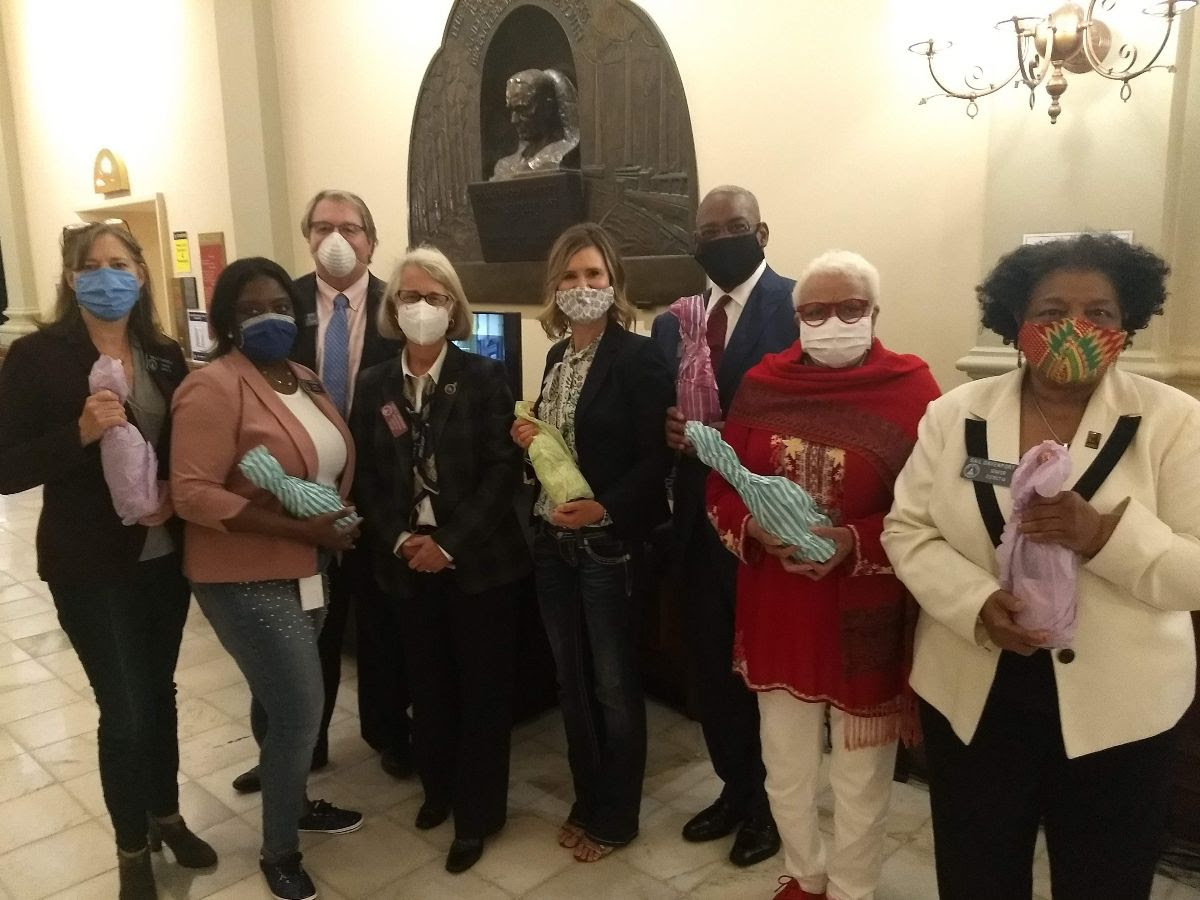 |
|
DeKalb Ethics Bill: Rep. Karla Drenner gives all the DeKalb Senators a gift of champagne for passing revised DeKalb Ethics Legislation after voters rejected the 2019 bill.
|
|
 |
|
Sine Die: The House did not allow confetti throwing and kept social distancing rules all week. I left the chamber quickly, because people were wanting to give me hugs.
|
|
|
Senator Sally Harrell, Georgia Senate District 40
|
|



